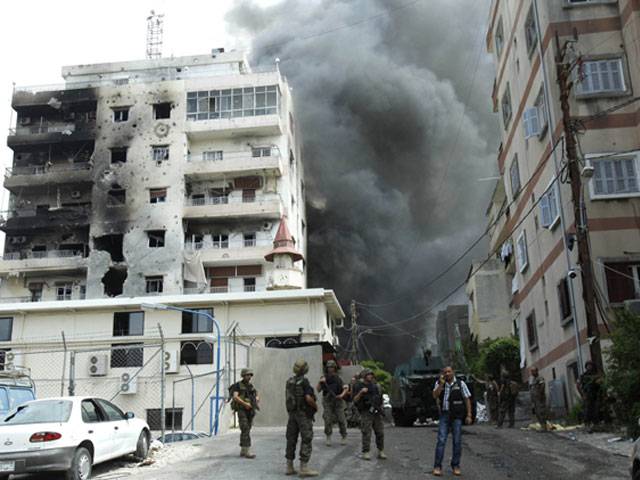SIDON, Lebanon - Lebanese security forces launched a major manhunt on Tuesday for radical cleric Ahmad al-Assir, after clashes with his supporters in southern Sidon that left 17 soldiers dead.
In the coastal city meanwhile, the army worked to consolidate its control, after troops overran Assir's headquarters on Monday afternoon.
Soldiers evacuated civilians trapped in their homes since the fighting began on Sunday afternoon, and detonated explosives abandoned by Assir's supporters as they fled on Monday.
The 24 hours of clashes were the worst to hit Lebanon since the beginning of the conflict in neighbouring Syria, which has inflamed sectarian tensions in Lebanon, sparking sporadic fighting. A day of mourning was announced for the 17 soldiers killed in the fighting, and the government held a moment of silence.
Speculation was rife as to the whereabouts of Assir, the radical cleric known for his opposition to Lebanon's powerful Shia Hezbollah movement, and his antagonism to the army.
A day earlier, the Lebanese judiciary issued a detention order for Assir and 123 of his followers, and on Tuesday, Lebanon's military and security bodies were all mobilised to search for him, a security source said.
"There are several hypotheses on his whereabouts," the source said.
"Some say he is disguised as a woman and that he has travelled to Tripoli (in northern Lebanon). Others say he may have fled to Syria."
"It is also possible he is hiding in the Ain al-Helweh," he added, referring to a Palestinian refugee camp in Sidon.
A military source said the army had arrested "dozens of people suspected of loyalty" to Assir as they captured his headquarters on Monday night.
Journalists who toured the complex, which includes a mosque, several office building and apartment blocks, saw abandoned weapons, including rocket launchers and machine guns, as well as fatigues.
The complex in Abra, on the eastern outskirts of Sidon, is a residential area and dozens of civilians were trapped by the fighting, which left several apartments in the area burned out.
The fighting raised international concern, with UN Secretary General Ban Ki-moon condemning attacks on the military and appealing to Lebanese troops to remain loyal.
The United States also condemned the violence, and the US embassy in Beirut reiterated its standing travel warning urging US citizens to "avoid all travel to Lebanon because of safety and security concerns."
The violence began on Sunday evening, when Assir's supporters opened fire on an army checkpoint, reportedly after a car carrying his backers was stopped.
The clashes quickly spread, with his supporters and the army exchanging gun and mortar fire, terrifying local residents.
The fighting was condemned by figures across Lebanon's political spectrum, including Sunni leaders who distanced themselves from Assir.
The controversial cleric was virtually unknown until the beginning of the Syrian conflict, but gained prominence for his criticism of Hezbollah and its support for the regime of Syrian President Bashar al-Assad.
He slammed the group for sending fighters to Syria to battle the Sunni-led uprising alongside regime troops, and encouraged his own followers to join rebel forces there.
The conflict has exacerbated sectarian tensions in Lebanon, particularly between Shias who back the Syrian regime, and Sunnis who favour the uprising.
Assir has also called for Hezbollah to be disarmed, a popular cause with many Lebanese who resent the group's power, and criticised the army which he claims turns a blind eye to the group's armoury.
Last week, his supporters clashed with Hezbollah backers in the Abra neighbourhood, in fighting that left one civilian dead.
Sunni leaders on Monday urged the army to work "fairly and thoroughly" to disarm all groups in Lebanon."
The law "needs to apply to all Lebanese equally. The state's institutions are responsible for all Lebanese... without distinction," they said.
Sunday, May 19, 2024
Sidon clashes over, Lebanese forces hunt cleric Assir

Sports & Genocide
May 18, 2024
Healing AJK
May 18, 2024
A New World Order
May 18, 2024
Tobacco Toll
May 17, 2024
Rushed Reforms
May 17, 2024
Continuing Narrative of Nakba
May 18, 2024
Teacher Struggles
May 18, 2024
No Filers out of Reach
May 18, 2024
Hoax of Inflation Coming Down
May 17, 2024
Rising Inflation
May 17, 2024
ePaper - Nawaiwaqt
Advertisement
Nawaiwaqt Group | Copyright © 2024





